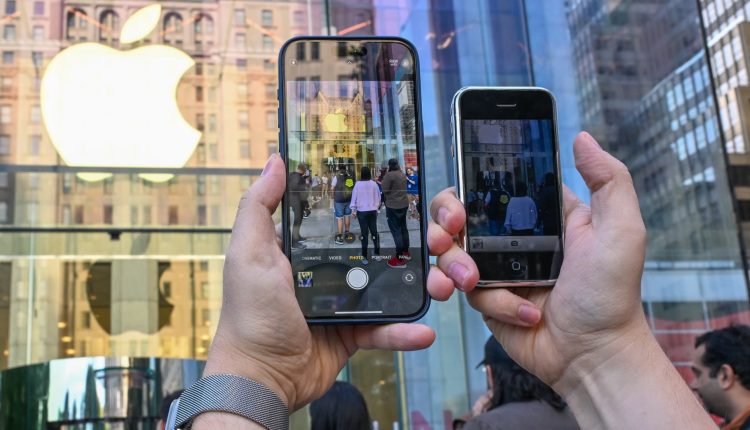A rare Apple downgrade — and the price move after — is why we don’t market time
0 2
This week’s rare Wall Street downgrade of Apple (AAPL) is the perfect example of why we don’t try to time the stock market. In a note to clients late Tuesday, KeyBanc lowered its rating on shares of the tech giant to hold from buy. If sold some Apple at the open on Wednesday at $171 on fears of a sell-off, we would have been sorry. Not only did Apple close higher on Wednesday, it added to those gains on Thursday and Friday. We would have missed out on a 3.8% gain over three trading days. Trying to sell a stock higher with the intention of buying it back lower is a difficult game. You may get lucky every once in a while. But for most investors, the potential reward is not worth the risk. Just because you think a stock is going lower in the near term doesn’t mean you should necessarily take action. After all, how many times have we seen a stock look expensive on estimates only to be proven far less expensive once the actual results come in — Nvidia (NVDA) anyone? Back in May, we wrote about how the chip stock surged 25% but got cheaper on a valuation basis. To be sure, we do trade around core positions for many reasons. We book profits after big runs, right-size positions that get too large, and trim to raise cash. We also sell when the outlook for a stock has changed, calling into question our investment thesis. However, it’s not our style to trim or trade out of a name purely on the view that we can buy the shares back a few percentage points lower. To better illustrate this thinking, we ran a few scenarios around a 1,000-share position in Apple with a hypothetical sale price of $171 per share and a $161 repurchase price. We used our real $205 per share Club price target on Apple. The “Ride it Out” scenario would yield a paper profit of $34,000 on a move from $171 in Apple shares to $205 based on ownership of 1,000 total shares. This is our “own it, don’t trade it” strategy. The “Sell and Never Get Back In” scenario assumes a 100-share sale at $171 and no repurchase. Your profit on 900 shares would be $30,600 at a $205 stock price. This is the worst case because you sold and never got back for the rally. You locked in $17,100 in cash but left upside on the table because those 100 shares at $205 are worth $20,500. The “Sell and Rebuy 100 shares $10 lower” scenario assumes nailing a $171 sale and a repurchase of 100 shares at $161. Your profit would be $35,000 based on 1,000 shares at $205, plus $1,000 in cash. But consider that you risked $3,400 — the difference between Scenario 1 and Scenario 2 — to make just $1,000 more profit than Scenario 1. Even if the odds of pulling off the trade were a generous 50/50, risking $3,400 to make $1,000 isn’t a great deal. You wouldn’t bet on a sports underdog with those odds, would you? By the same token, we would never say stick your head in the sand when volatility strikes. If you think the pullback in a stock could be over 20% or more, trimming could be sensible. But in a run-of-the-mill attempt at market timing on an event like a downgrade — trying to sell high and repurchase low — you are better off weathering the short-term swings. (Jim Cramer’s Charitable Trust is long AAPL, NVDA. See here for a full list of the stocks.) As a subscriber to the CNBC Investing Club with Jim Cramer, you will receive a trade alert before Jim makes a trade. Jim waits 45 minutes after sending a trade alert before buying or selling a stock in his charitable trust’s portfolio. If Jim has talked about a stock on CNBC TV, he waits 72 hours after issuing the trade alert before executing the trade. THE ABOVE INVESTING CLUB INFORMATION IS SUBJECT TO OUR TERMS AND CONDITIONS AND PRIVACY POLICY , TOGETHER WITH OUR DISCLAIMER . NO FIDUCIARY OBLIGATION OR DUTY EXISTS, OR IS CREATED, BY VIRTUE OF YOUR RECEIPT OF ANY INFORMATION PROVIDED IN CONNECTION WITH THE INVESTING CLUB. NO SPECIFIC OUTCOME OR PROFIT IS GUARANTEED.
A person poses holding the original iPhone and the new iPhone 15 otuside the Fifth Avenue Apple Store ahead of the launch of Apple’s new iPhone 15 on September 22, 2022 in New York City.
Alexi Rosenfeld | Getty Images
This week’s rare Wall Street downgrade of Apple (AAPL) is the perfect example of why we don’t try to time the stock market.
Read the full article here
0 2

